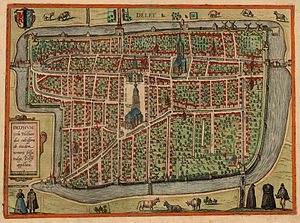Battle of Delft (1573)
| Battle of Delft (1573) | |||||||
|---|---|---|---|---|---|---|---|
| Part of the Eighty Years' War & the Anglo-Spanish War (1585) | |||||||
 A 1580 map of Delft by Georg Braun & Frans Hogenberg |
|||||||
|
|||||||
| Belligerents | |||||||
|
|
|
||||||
| Commanders and leaders | |||||||
|
|
|
||||||
| Strength | |||||||
| 6,000 (1,000 in Delft) | 4,000 | ||||||
| Casualties and losses | |||||||
| unknown but low | 700 casualties | ||||||
The Battle of Delft also known as the Defence of Delft was a military engagement that fought during the Eighty Years' War and the Anglo–Spanish War which took place in October 1573 in and outside the city of Delft. The battle was fought by a small Anglo-Dutch force under Thomas Morgan and an attacking Spanish force under Francisco de Valdez. The Spanish were repelled and forced to retreat.
The Spanish Governor of the Netherlands Fernando de Toledo (the 3rd Duke of Alba) had besieged Alkmaar in August but had been repelled. Soon after in early October, Leiden was besieged but a chance of a quick victory disappeared when the Spanish realised the city had stronger defences and a well stocked garrison. Alba then sent the master of his camp Francisco de Valdez with his veteran Tercio soldiers along with twelve companies of Walloons; in all numbering 4,000 men under the command of Julián Romero to advance deep into Holland. His objective was to seize the rich villages and outlying towns between Leiden, Delft and the sea coast as far as the River Maas so that all relief for Leiden could be cut off. Valdez captured The Hague without any resistance and soon the place was fortified by them.
Meanwhile Thomas Morgan's regiment of English, several Scots, a few French Huguenot companies besides the States troops under the command of the Prince of Orange were lodged in the villages between Delft and Rotterdam safely from the Spanish. They were positioned before large dykes on both sides of the roads. One position secured the Prince in control of the alluvial quadrangle watered on two sides by the rivers IJssel and the Mass. One company of English held this position and was under the command of Roger Williams and included the poet George Gascoigne. Captain Edward Chester was posted in the Polderwaert, another fortified position in between Delft and Rotterdam. These troops were ready to shore up any last ditch defence if Delft, Rotterdam and Delfshaven had been attacked by the Spanish.
...
Wikipedia
